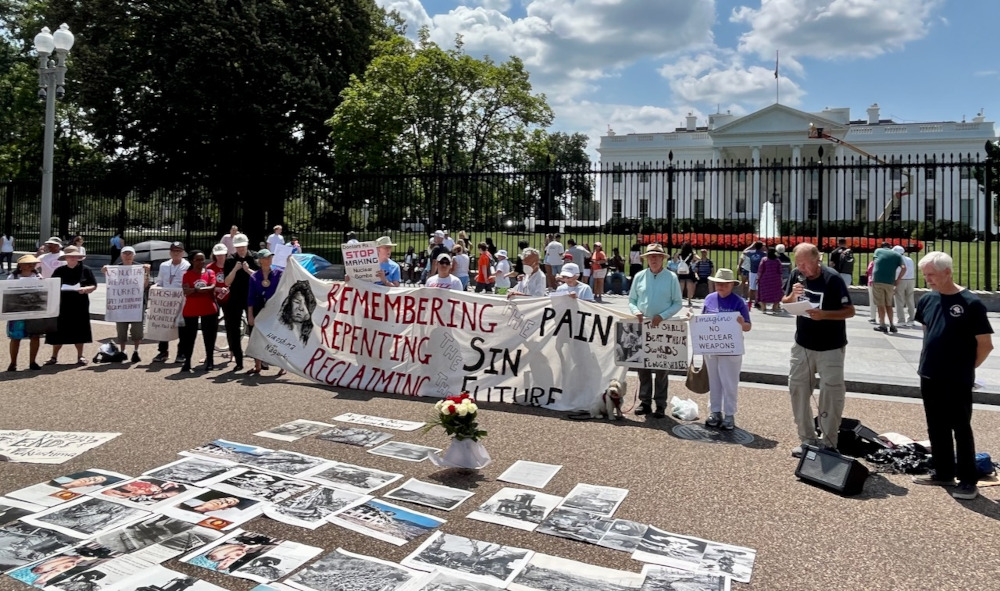
Art Laffin, a member of Dorothy Day Catholic Worker House in Washington, D.C., speaks during a vigil outside the White House on Aug. 9 to commemorate the U.S. atomic bombings of Hiroshima and Nagasaki, Japan in 1945. (NCR photo/ Joshua J. McElwee)
Catholics marked the 78th anniversary of the United States' 1945 atomic bombings in Japan with calls for nuclear disarmament, prayers for peace and a protest at the White House.
The Dorothy Day Catholic Worker House gathered about three dozen protesters for a vigil outside the White House Aug. 9 to mark the occasion with prayer, and to call on the U.S., the only nation that has used such weapons in war, to lead the way to a world where they are never again used. The group held a similar demonstration outside the Pentagon Aug. 6.
A "litany of repentance" prayed in front of the White House was briefly interrupted by a street vendor playing the "Cha Cha Slide," but the group was able to resume their ceremony, which included songs and laying roses on pictures of victims and survivors.
During World War II, the U.S. used nuclear weapons on the Japanese cities of Hiroshima on Aug. 6, 1945, and Nagasaki Aug. 9, 1945. Those bombings marked the first -- and to date, only -- use of atomic weapons in war. Tens of thousands of people were killed in each of the initial explosions, and still more died from radiation poisoning in the following years. On Aug. 10, 1945, the day following the bombing of Nagasaki, the Japanese government signaled its intent to accept the Allied terms of surrender, with their formal surrender taking place Sept. 2, 1945.
Then-President Harry Truman argued the use of the bombs brought about Japan's prompt and unconditional surrender, but critics of that decision have argued that there were other ways to end the conflict and the use of such indiscriminate weapons on civilian population centers constitutes a war crime.
According to the Bulletin of the Atomic Scientists, the U.S. atomic bombings of the two Japanese cities are estimated to have killed between 110,000-210,000 people.
The U.N. Treaty on the Prohibition of Nuclear Weapons, which went into effect in 2021, made nuclear weapons illegal under international law, but it is largely symbolic, as the nuclear states, including the U.S. and Russia, have not ratified it.
Russian President Vladimir Putin's unprovoked invasion of Ukraine has prompted newfound concern about the use of nuclear weapons, and U.S. President Joe Biden has said such a threat by the Russian leader is "real."
In his annual state of the nation address Feb. 21, 2023, Putin announced Russia is suspending participation in the New START nuclear weapons treaty. The treaty, which took effect in 2011, is set to expire in February 2026. It is the last remaining major nuclear arms control treaty between the U.S. and Russia.
Asked by OSV News what he would like to see Biden, the nation's second Catholic president, do to prevent future use of such weapons, Art Laffin, a member of Dorothy Day Catholic Worker House, said Biden has mandates from both Pope Francis and the U.N. to prohibit nuclear weapons.
"We have to begin the process of dismantling the production of any new ones," Laffin said.
Advertisement
Pope Francis and the Holy See have embraced the U.N. treaty and the pontiff has said that "the use of nuclear weapons, as well as their mere possession, is immoral."
To mark the 78th anniversary of the Aug. 6, 1945, atomic bombing of Hiroshima, Archbishop Paul Etienne of Seattle and Archbishop John Wester of Santa Fe, New Mexico, led a "Pilgrimage of Peace" delegation from the U.S. to participate in an interfaith prayer and memorial ceremony in Japan.
"It was hard to fathom that with just one bomb, this entire city along with some 140,000 people died as a result, far more than the tens of thousands gathered this morning to remember them," Etienne wrote on his blog about the event at the Atomic Bomb Memorial Mound organized by the Hiroshima Prefecture Federation of Religions. The archbishops attended a similar memorial days later commemorating the Aug. 9, 1945, atomic bombing of Nagasaki.
"Let us work to advance not only the cause of peace," he said, "but achieve this necessary gift of peace for ourselves and the future."







